Related Research Articles

The Life of Oharu is a 1952 Japanese historical drama film directed by Kenji Mizoguchi. The screenplay by Yoshikata Yoda is based on various stories from Saikaku Ihara's 1686 work The Life of an Amorous Woman. Kinuyo Tanaka stars as Oharu, a one-time concubine of a daimyō who struggles to escape the stigma of having been forced into prostitution by her father.
Michiyo Okusu is a Chinese-born Japanese actress. She has been nominated for four Japanese Academy Awards, and won the 1981 Outstanding Performance by an Actress in a Supporting Role prize for her performance in Zigeunerweisen. She began her career as a film ingenue using the stage name Michiyo Yasuda, under which she scored major early successes with films such as A Fool's Love and numerous love stories and "samurai" period piece dramas.
Junko Miyashita is a Japanese actress who had a long and varied career working both in pink film and mainstream cinema.

Tatsumi Kumashiro was a Japanese film director and screenwriter known for his critically acclaimed, award-winning Roman Porno films.
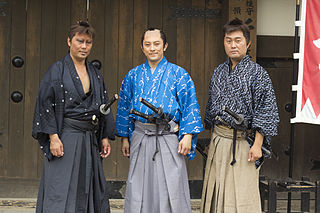
Chanbara (チャンバラ), also commonly spelled "chambara", meaning "sword fighting" films, denotes the Japanese film genre called samurai cinema in English and is roughly equivalent to Western and swashbuckler films. Chanbara is a sub-category of jidaigeki, which equates to period drama. Jidaigeki may refer to a story set in a historical period, though not necessarily dealing with a samurai character or depicting swordplay.

Kwon Ki-ok was the first Korean female aviator, as well as one of the first female pilots in China. Her name in Chinese is Quan Jiyu. Kwon went into exile in China during the Japanese occupation of Korea and became a lieutenant colonel in the Republic of China Air Force. She returned home after the liberation of Korea and became a founding member of the Republic of Korea Air Force.
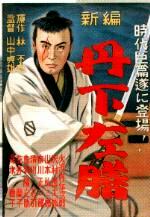
The Million Ryo Pot is a 1935 Japanese jidaigeki comedy film directed by Sadao Yamanaka. The plot revolves around a pot, which contains the map to a treasure worth a million ryō, that is lost by its owner and comes into the possession of a young boy, who happens to be under the custody of the great rōnin swordsman Tange Sazen. Unaware that he is in possession of such riches, Tange spends much of his time caring for the boy and bickering with the boy's adopted mother, his love interest, in a manner akin to a screwball comedy. The film is a parody of the more serious samurai films of the time, with Yamanaka transforming Tange from a rebellious, anarchic rōnin into a child-loving and openhearted homebody.

Our Lady of Akita is a title of the Blessed Virgin Mary associated with the Marian apparitions reported in 1973 by Sister Agnes Katsuko Sasagawa in the remote area of Yuzawadai, an outskirt of Akita, Japan. The messages emphasize prayer and penance in combination with cryptic prophecies warning of sacerdotal persecution and heresy within the Catholic Church. A wooden statue representing the apparitions is venerated by the Japanese faithful and other Catholics. In December 1973, a Japanese television station videotaped tears coming from the statue's eyes.

Tai Kato was a Japanese film director and screenwriter. He was best known for making yakuza films at the Toei Company in 1960s.

Kimiyoshi Yasuda was a Japanese film director from the 1930s to 1970s. He directed six films about Zatoichi, the Blind Swordsman.

Ichijo's Wet LustakaIchijo's Wet Desire, Drenched Passion, Sayuri Ichijo: Moist Desire, Following DesireandSayuri Ichijō: Wet Lust is a 1972 Japanese film in Nikkatsu's Roman porno series, directed by Tatsumi Kumashiro and starring the famous stripper Sayuri Ichijō as herself, and co-starring Kazuko Shirakawa and Hiroko Isayama. Considered one of the best films in the series, in 1999 Japanese critics voted it one of the 100 best Japanese films of the 20th century.
Zatoichi: On the Road is a 1963 Japanese Chambara film directed by Kimiyoshi Yasuda starring Shintaro Katsu as the blind masseur Zatoichi, originally released by the Daiei Motion Picture Company. Zatoichi: On the Road is the fifth episode in the 26 part film series devoted to the character of Zatoichi.
OP Eiga (オーピー映画), also known as Ōkura Eiga (大蔵映画) or Okura Pictures, is the largest and one of the oldest independent Japanese studios which produce and distribute pink films. It was founded in 1961 by Mitsuru Ōkura, former president of film studio Shintōhō. Along with Shintōhō Eiga, Kantō, Million Film, and Kōji Wakamatsu's production studio, Ōkura was one of the most influential studios on the pink film genre. Among the many notable pink films released by the studio are Satoru Kobayashi's Flesh Market (1962), the first film in the pink film genre.
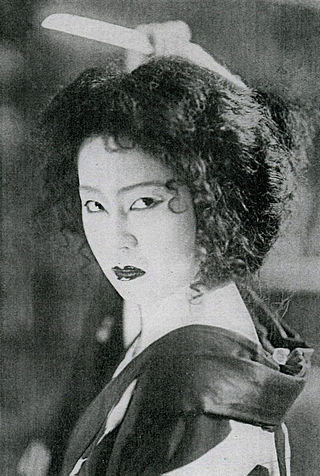
Komako Kuragata, known professionally as Komako Hara, was a Japanese film actress who was particularly prominent in the silent era.
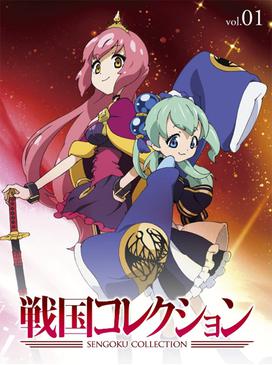
Sengoku Collection was a mobile social networking game created by Konami, which was launched for the Mobage service in December 2010. The series features female representations of feudal lords from the Sengoku period. An anime television series adaptation produced by Brain's Base aired on TV Tokyo between April 5, 2012 and September 27, 2012.
Zatoichi's Revenge is a 1965 Japanese chambara film directed by Akira Inoue and starring Shintaro Katsu as the blind masseur Zatoichi. It was originally released by the Daiei Motion Picture Company.
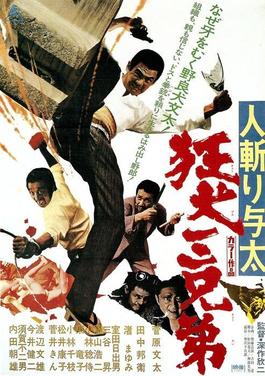
Outlaw Killers: Three Mad Dog Brothers, is a 1972 Japanese yakuza film directed by Kinji Fukasaku.
Asao Koike was a Japanese actor. He is most famous for playing yakuza roles. He is also known as voice actor. In 1950, he joined the Bungakuza Theatre Company. In 1963, he left the Bungakuza Theatre Company and established the Kumo Theatre Company. He appeared in more than 120 films.
Isamu Nagato was a Japanese actor from Kurashiki Okayama Prefecture. He was an actor who specialized in playing comical roles. He became popular for his role as Sakura Kyōjyurō in the Three Outlaw Samurai series.
References
- ↑ "The Jidai-Geki Knights: Sonosuke Sawamura". lardbiscuit.com.
- ↑ "女左膳 濡れ燕片手斬り". Kinema Junpo . Retrieved March 19, 2020.
- ↑ "Lady Sazen and the Drenched Swallow Sword". kurotokagi.com.